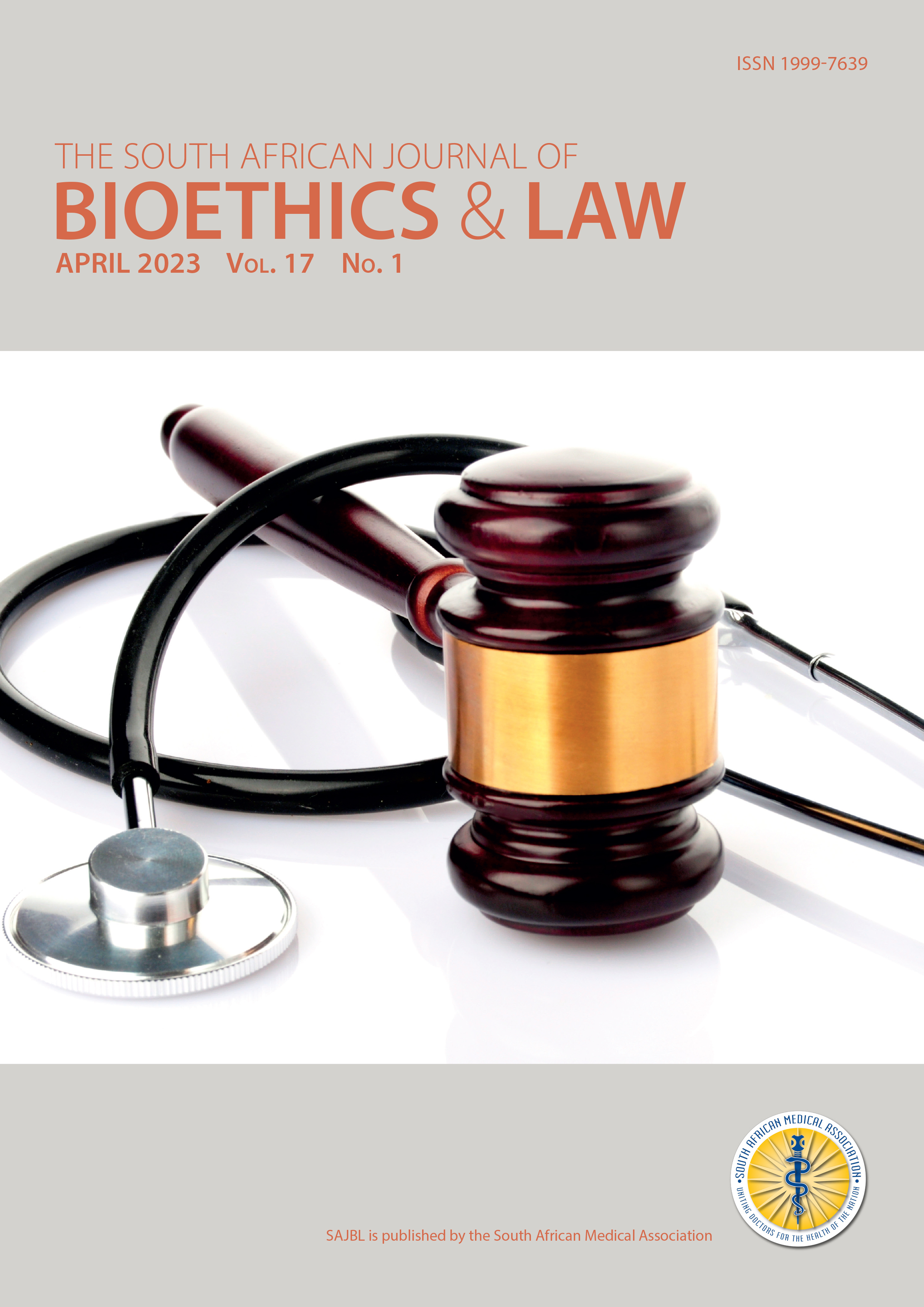Futility, communicating bad news and burnout in doctors and other health practitioners
Main Article Content
Abstract
Futile medical interventions have virtually no chance of success. Doctors might perform such procedures because of pressure from families or patients. The doctor might also have an ulterior motive of gain or prefer to do it rather than take time to communicate with the patient about a poor prognosis. Established ways to communicate bad news to patients are not always used by managing physicians with time constraints. The SPIKES protocol method is outlined to assist in sensitive communication where further intervention is futile.
This review primarily explores various aspects of medical futility. It also explores strategies for effectively communicating with patients and their families regarding futility interventions. A side-effect of futile interventions is burnout in doctors and other health practitioners (HPs). The complex relationship between futility and burnout is described.
Article Details
Issue
Section

This work is licensed under a Creative Commons Attribution-NonCommercial 4.0 International License.
The SAJBL is published under an Attribution-Non Commercial International Creative Commons Attribution (CC-BY-NC 4.0) License. Under this license, authors agree to make articles available to users, without permission or fees, for any lawful, non-commercial purpose. Users may read, copy, or re-use published content as long as the author and original place of publication are properly cited.
Exceptions to this license model is allowed for UKRI and research funded by organisations requiring that research be published open-access without embargo, under a CC-BY licence. As per the journals archiving policy, authors are permitted to self-archive the author-accepted manuscript (AAM) in a repository.
How to Cite
References
Trotter G. Mediating disputes about medical futility. Camb Q Healthc Ethics 1998;8(4):527-537.
Chamberlin P, Lambden J, Kozlov E, et al. Clinicians’perceptions of futile or potentially inappropriate care and associations with avoidant behaviors and burnout. J Palliat Med 2019;22(9):1039-1045. https//doi.org/10.1089/jpm.2018.0385
Lambden JP, Chamberlin P, Kozlov E, et al. Association of perceived futile or potentially inappropriate care with burnout and thoughts of quitting among health-care providers. Am J Hosp Palliat Care 2019;36(3):200-206. https//doi. org/10.1177/1049909118792517
McQuoid-Mason D. Should doctors provide futile medical treatment if patients or their proxies are prepared to pay for it? S Afr Med J 2017;107(2):108-109. https//doi.org/10.7196/SAMJ.2017.v107i2.12191
Guidelines for the withholding and withdrawing of treatment (Booklet 7). HPCSA (Health Professions Council of South Africa). Pretoria, South Africa 2023 https:// www.hpcsa.co.za/Content/upload/professional_practice/ethics/Booklet_7_ Guidelines_withholding_and_withdrawing_treatment_March_2023.pdf (accessed 24 September 2023).
Sokol DK. The slipperiness of futility. BMJ 2009;338:1418. https//doi.org/10.1136/ bmj.b2222
Trotter G. Futility in the 21st century. HEC Forum 2007;19:1-12. https//doi. org/10.1007/s10730-007-9032-7
da Silva Vieira JV, Deodato S, Mendes F. The concept of futility in health: A scoping review. Clinical Ethics 2021;16(4):1-7. https//doi.org/10.1177/1477750920977109
Schneiderman LJ, Jecker NS, Jonsen AR. Medical futility: Its meaning and ethical implications. Ann Int Med 1990;112(12):949-954. https//doi.org/10.7326/0003- 4819-112-12-949
Straw S, Byrom R, Gierula J, et al. Predicting one‐year mortality in heart failure using the ‘Surprise Question’: A prospective pilot study. Eur J Heart Fail 2019;21(2):227- 234. https//doi.org/10.1002/ejhf.1353
Helft PR, Siegler M, Lantos J. The rise and fall of the futility movement. N Engl J Med 2000;343(4):293-296.
Buckman R. Breaking bad news: why is it still so difficult? Br Med J (Clin Res Ed ) 1984;288(6430):1597-1599. https//doi.org/10.1136/bmj.288.6430.1597
Kumar V, Sarkhel S. Clinical practice guidelines on breaking bad news. Indian J Psychiatry 2023;65(2):238-244. https//doi.org/10.4103/indianjpsychiatry. indianjpsychiatry_498_22
MondenKR,GentryL,CoxTR.Deliveringbadnewstopatients.Proc(BaylUnivMed Cent) 2016;29(1):101-102. https//doi.org/10.1080/08998280.2016.11929380
Larkin C, Searight HR. A systematic review of cultural preferences for receiving medical “bad news” in the United States. Health 2014;2014:2162-2173. https//doi. org/10.4236/health.2014.616251
Baile W, Buckman R, Lenzi R, Glober G, Beale E, Kudelka A. SPIKES--a six-step protocol for delivering bad news: Application to the patient with cancer. Oncologist. 2000;5(4):302-11. https//doi.org/10.1634/theoncologist.5-4-302
Balint M. The doctor, his patient and the illness. London: Pitman Paperbacks, 1971, 3rd Ed.
Meltzer LS, Huckabay LM. Critical care nurses’ perceptions of futile care and its effect on burnout. Am J Crit Care 2004;13(3):202-208.
Maphumulo WT, Bhengu BR. Challenges of quality improvement in the healthcare of South Africa post-apartheid: A critical review. Curationis 2019;42(1):1-9. https// doi.org/10.4102/curationis.v42i1.1901
Job burnout: How to spot it and take action. https://www.mayoclinic.org/healthy- lifestyle/adult-health/in-depth/burnout/art-20046642 (accessed 14 October 2023).
Mohamed AS, Dia SA. Prevalence of burnout among African healthcare workers.
Southern Afr J Public Health 2019;3(2):32-33.
Zeijlemaker C, Moosa S. The prevalence of burnout among registrars in the School of Clinical Medicine at the University of the Witwatersrand, Johannesburg, South Africa. S Afr Med J 2019;109(9):668-672. https//doi.org/10.7196/SAMJ.2019.v109i9.13667
Zhang X-j, Song Y, Jiang T, Ding N, Shi T-y. Interventions to reduce burnout of physicians and nurses: An overview of systematic reviews and meta-analyses. Medicine (Baltimore) 2020;99(26):1-13. https//doi.org/10.1097/MD.0000000000020992
Howe A, Smajdor A, Stöckl A. Towards an understanding of resilience and its relevance to medical training. Med Educ 2012;46(4):349-356. https//doi.org/10.1111/ j.1365-2923.2011.04188.x
Balme E, Gerada C, Page L. Doctors need to be supported, not trained in resilience. BMJ 2015;351. https//doi.org/ 10.1136/bmj.h4709
Hlubocky F, Taylor L, Marron J, et al. A call to action: ethics committee roundtable recommendations for addressing burnout and moral distress in oncology. JCO Oncol Pract 2020;16:191-199. https//doi.org/10.1200/JOP.19.00806
Chambers D. Govt should cover burnout leave, SA expert argues – and ignoring WhatsApp should be a legal right. https://www.news24.com/news24/bi-archive/ govt-should-cover-burnout-leave-sa-expert-argues-and-ignoring-whatsapp- should-be-a-legal-right-2022-10 (accessed 5 February 2024).
Calitz K. Burnout in the workplace. Obiter 2022;43(2):132-160.
Maslach C, Leiter MP. Understanding the burnout experience: recent research and its implications for psychiatry. World Psychiatry 2016;15(2):103-111. https//
doi.org/10.1002/wps.20311
Lenoir A-L, De Troyer C, Demoulin C, Gillain I, Bayot M. Challenges in treating physician burnout: the psychologist’s perspective. La Presse Médicale Open 2021;2:1-5. https//doi.org/10.1016/j.lpmope.2021.100006
Providingcareviewedasfutileorunnecessarylinkedtophysicianburnout,intention to quit. Ethics can do a lot to support clinical team. https://www.reliasmedia. com/articles/143918-providing-care-viewed-as-futile-or-unnecessary-linked-to- physician-burnout-intention-to-quit Accessed 5 February 2024.
